50+ Sample Conference Workshop Proposal
-
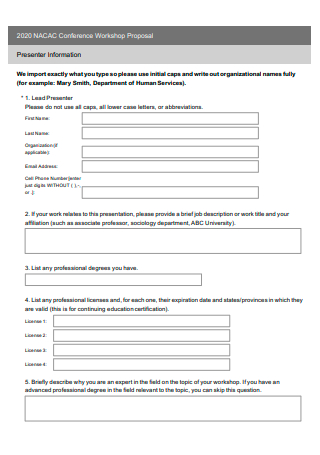
Conference Workshop Proposal Template
download now -
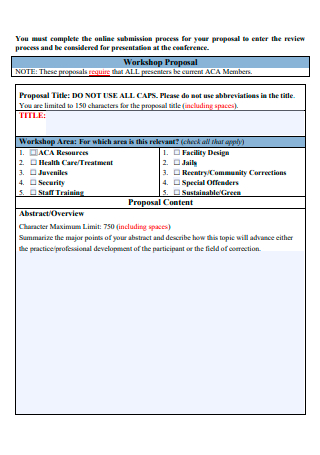
Basic Conference Workshop Proposal
download now -
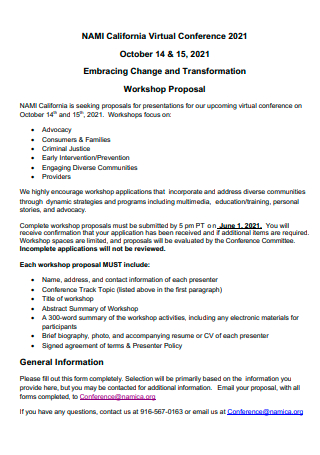
Virtual Conference Workshop Proposal
download now -
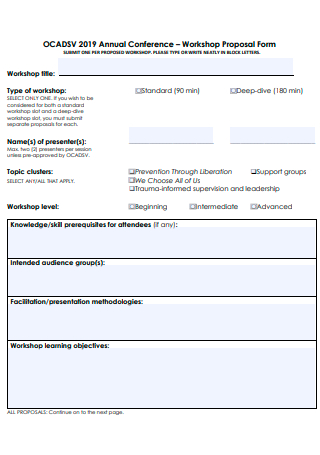
Annual Conference Workshop Proposal Form
download now -
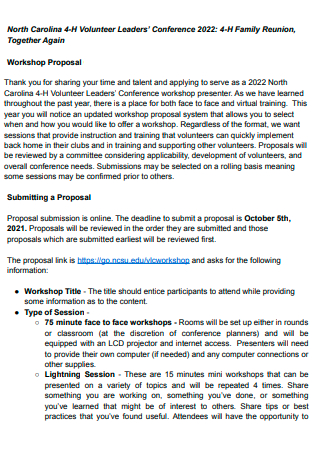
Volunteer Leaders Conference Workshop Proposal
download now -
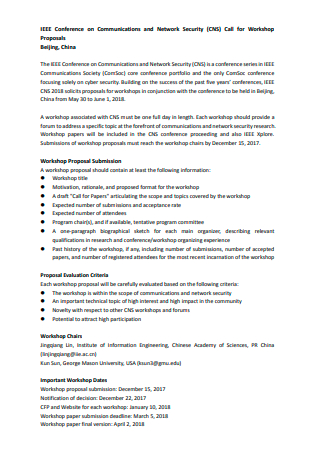
Conference Call For Workshop Proposal
download now -
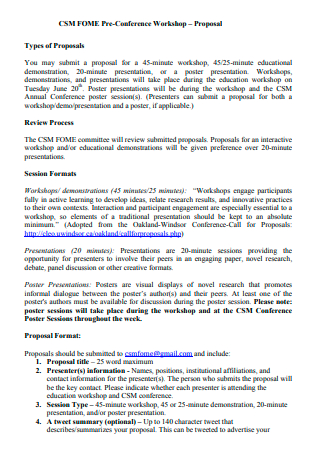
Pre-Conference Workshop Proposal
download now -
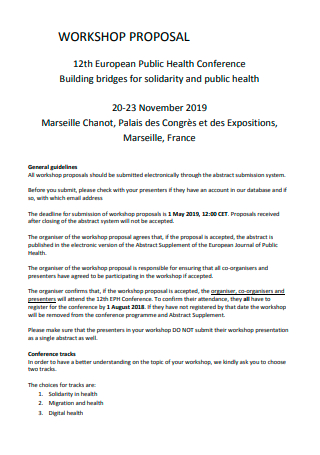
Public Health Conference Workshop Proposal
download now -
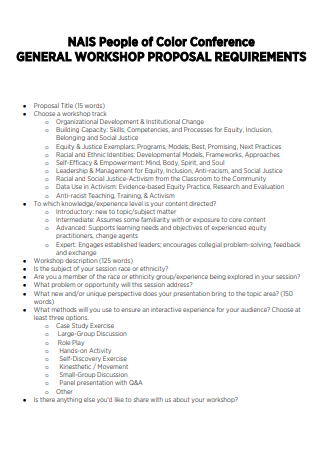
Conference General Workshop Proposal
download now -
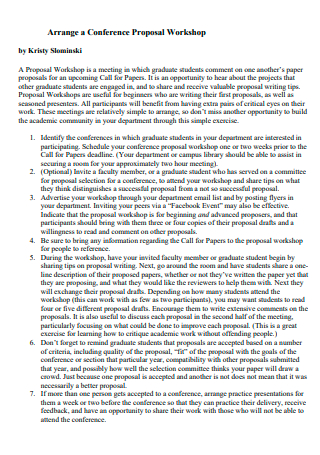
Conference Workshop Proposal in PDF
download now -
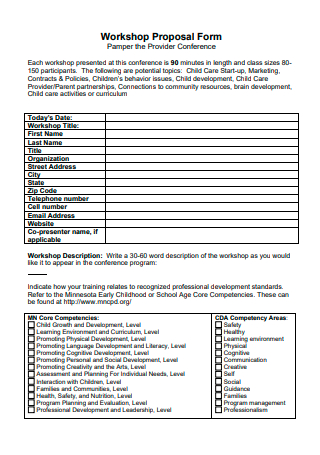
Conference Workshop Proposal Form
download now -
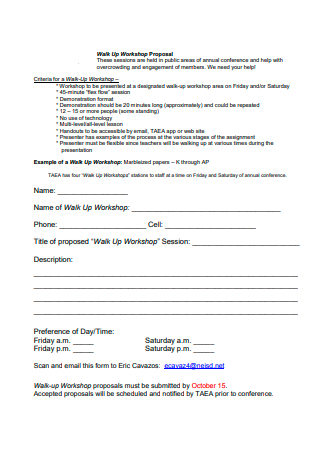
Conference Walk Up Workshop Proposal
download now -
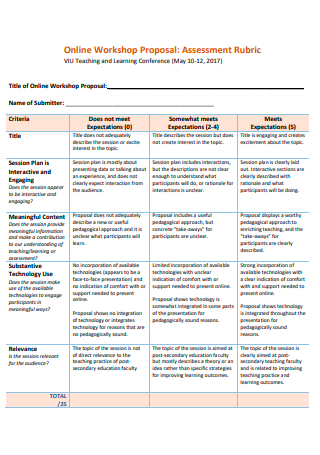
Teaching and Learning Online Conference Workshop Proposal
download now -
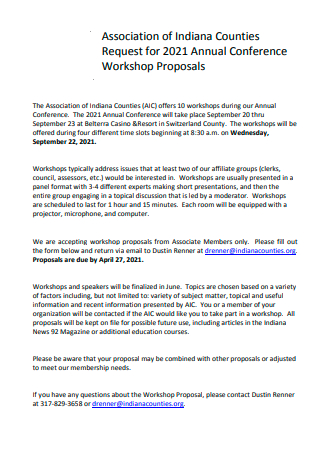
Annual Conference Workshop Proposal
download now -
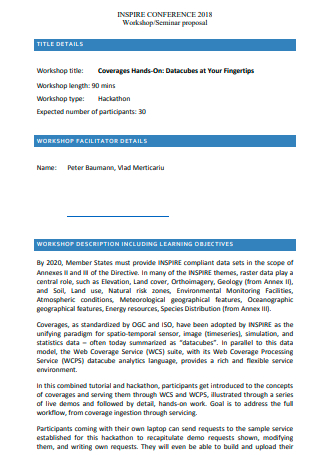
Conference Workshop Seminar Proposal
download now -
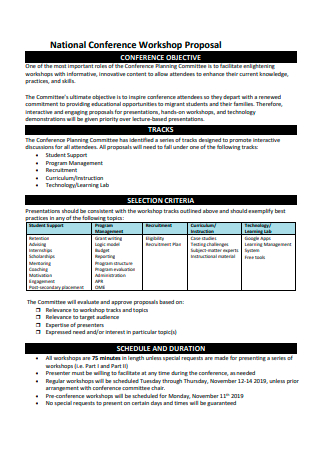
National Conference Workshop Proposal Template
download now -
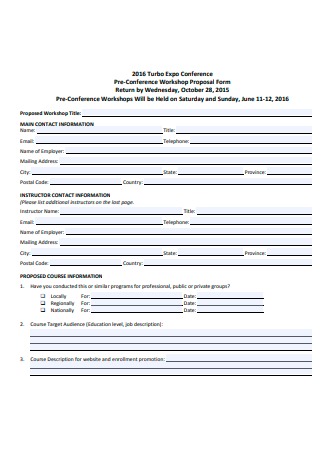
Pre-Conference Workshop Proposal Form
download now -
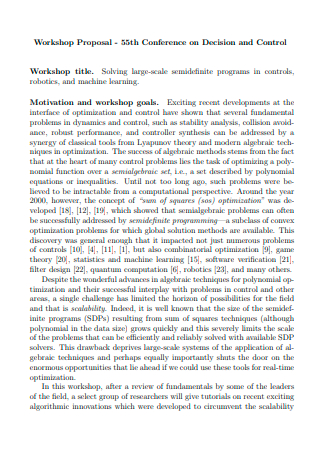
Conference on Decision and Control Workshop Proposal
download now -
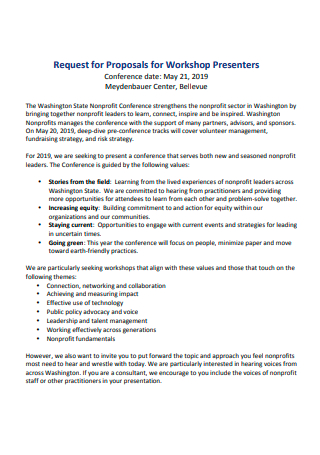
Conference Workshop Presenters Proposal
download now -
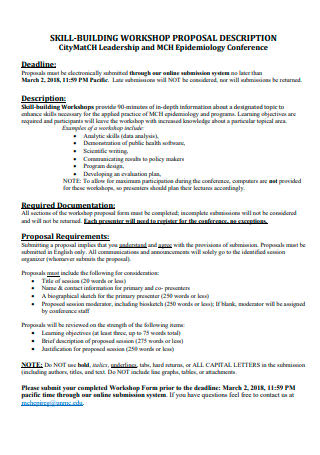
Conference Skill-Building Workshop Proposal
download now -
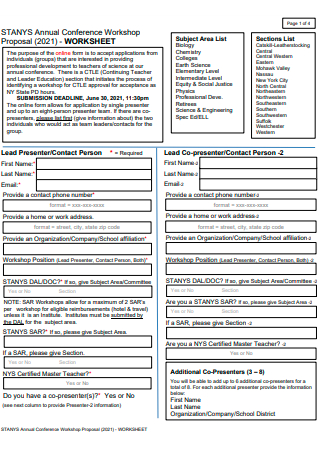
Annual Conference Workshop Proposal Worksheet
download now -
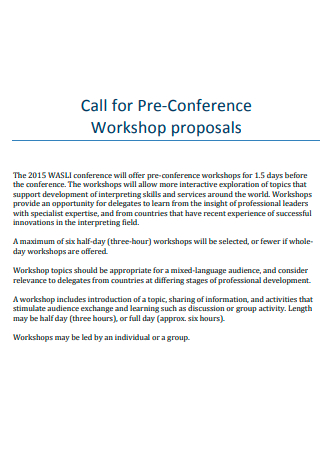
Call For Pre-Conference Workshop Proposal
download now -
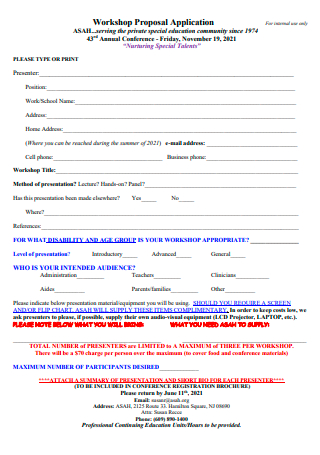
Annual Conference Workshop Proposal Application
download now -
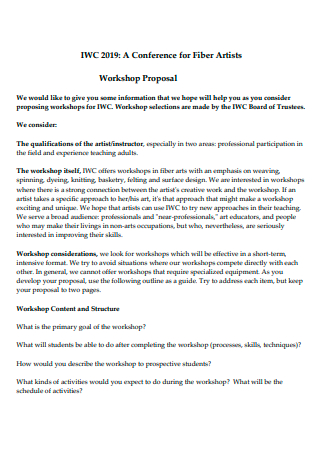
Conference For Fiber Artists Workshop Proposal
download now -
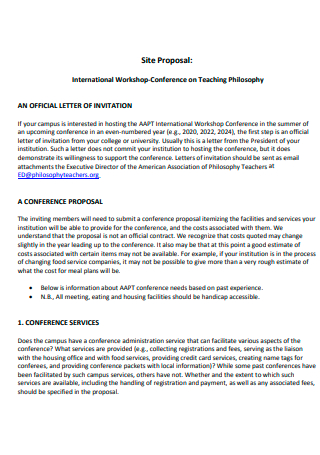
Conference International Workshop Site Proposal
download now -
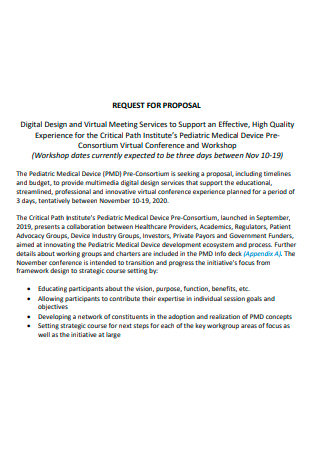
Conference Workshop Request For Proposal
download now -
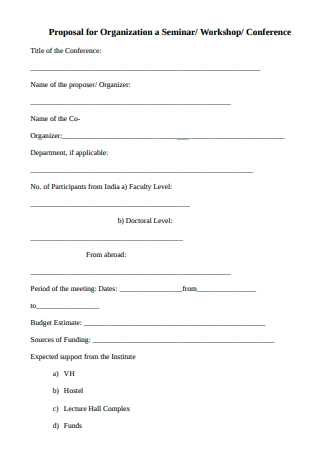
Conference Workshop Proposal For Organization
download now -
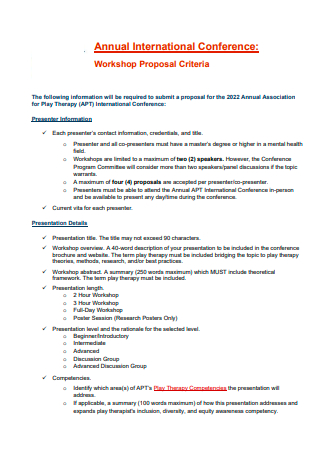
Annual International Conference Workshop Proposal
download now -
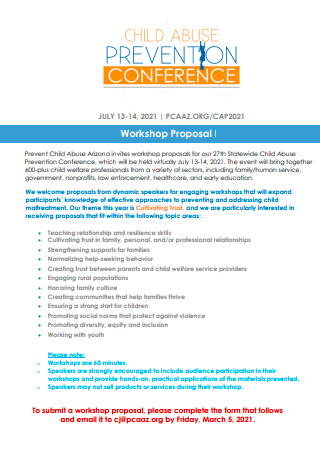
Child Prevention Conference Workshop Proposal
download now -
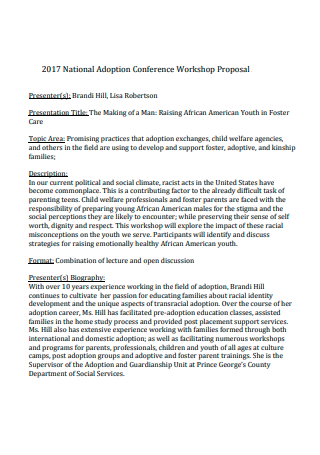
National Adoption Conference Workshop Proposal
download now -
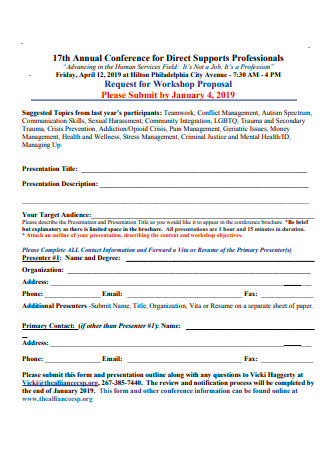
Annual Conference For Direct Supports Professional Workshop Proposa
download now -
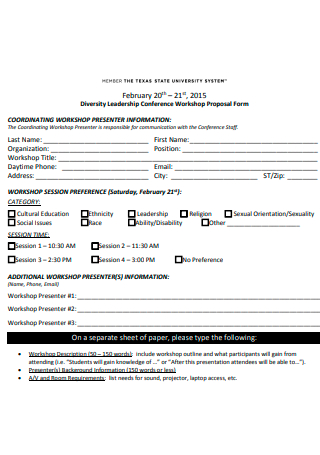
Diversity Leadership Conference Workshop Proposal Form
download now -
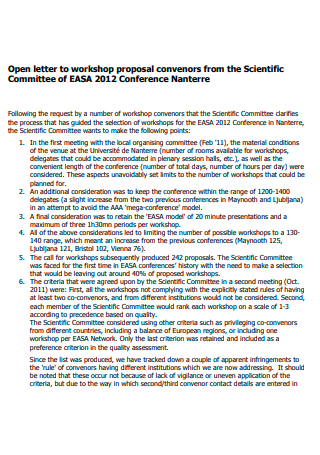
Printable Conference Workshop Proposal
download now -
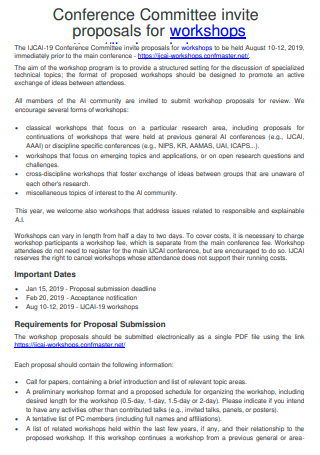
Conference Committee Workshop Proposal
download now -
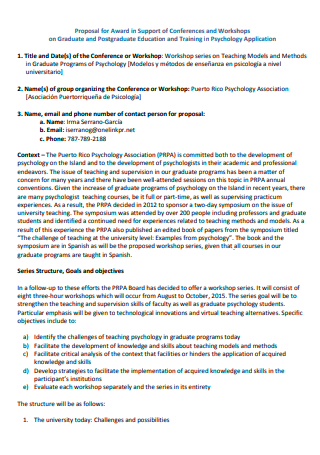
Conference Workshop Proposal For Award
download now -
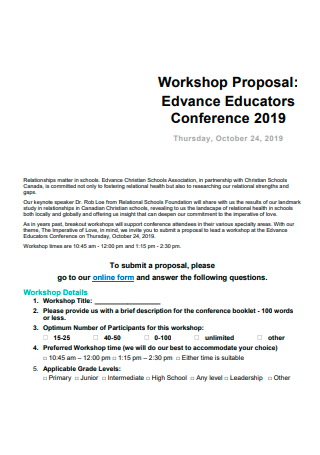
Educators Conference Workshop Proposal
download now -
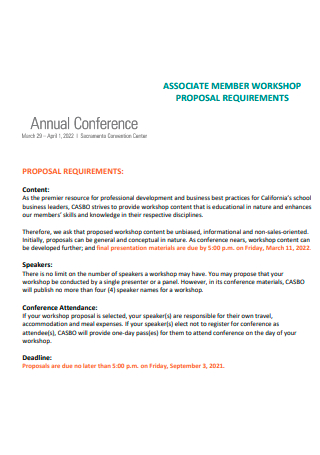
Annual Conference Associate Member Workshop Proposal
download now -
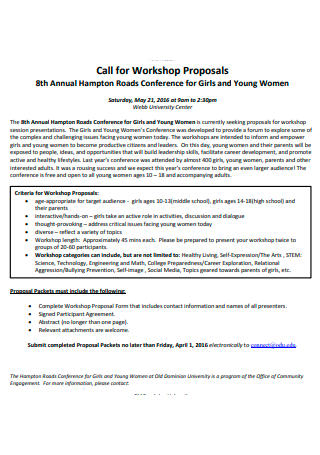
Annual Roads Conference Call For Workshop Proposal
download now -
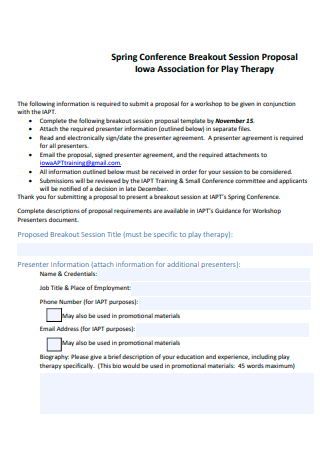
Conference Breakout Session Workshop Proposal
download now -
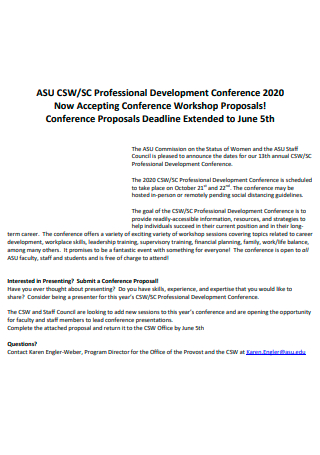
Professional Development Conference Workshop Proposal
download now -
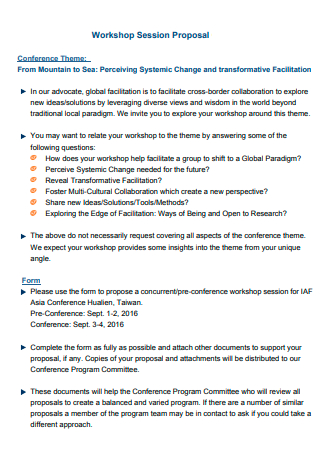
Conference Theme Workshop Session Proposal
download now -
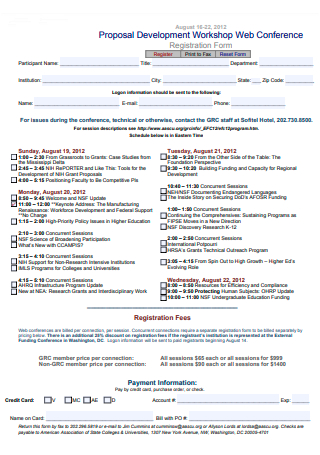
Web Conference Workshop Proposal Development
download now -
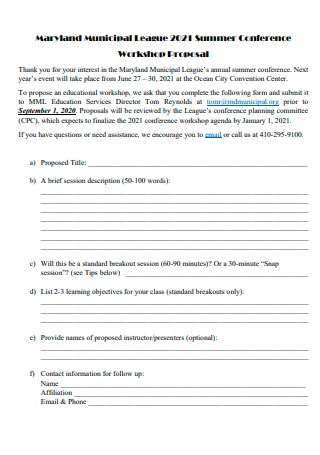
Summer Conference Workshop Proposal
download now -
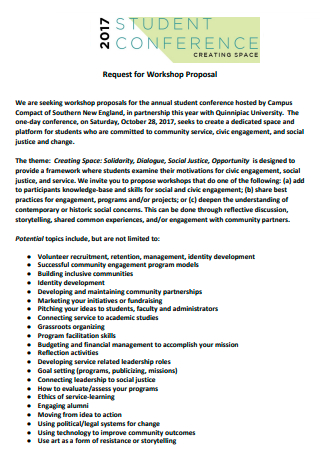
Student Conference Workshop Proposal
download now -
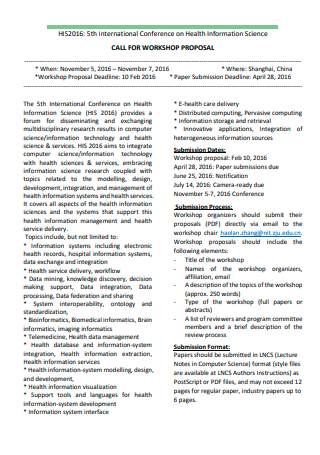
International Conference on Health Call For Workshop Proposal
download now -
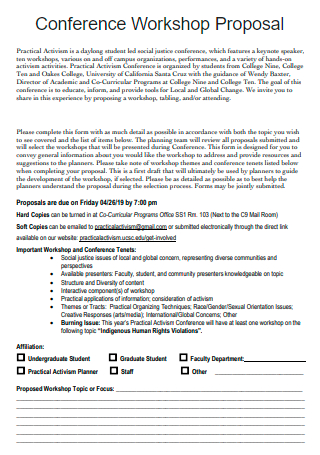
Conference Workshop Proposal Example
download now -
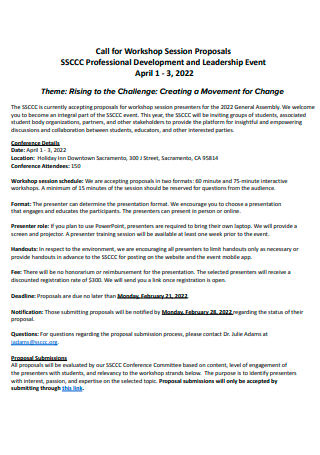
Conference Workshop Session Proposal
download now -
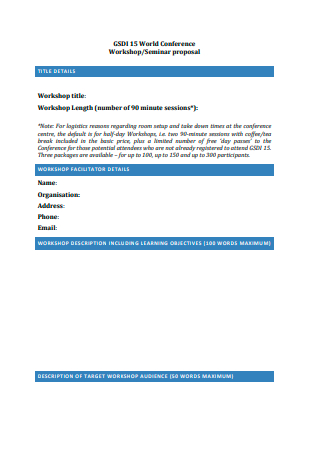
World Conference Workshop Seminar Proposal
download now -
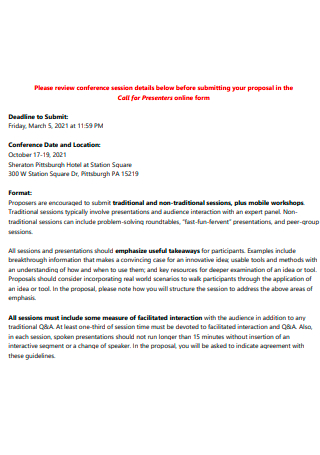
Simple Conference Workshop Proposal
download now -
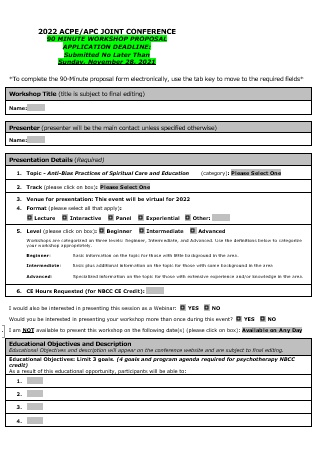
Conference Workshop Proposal Application
download now -
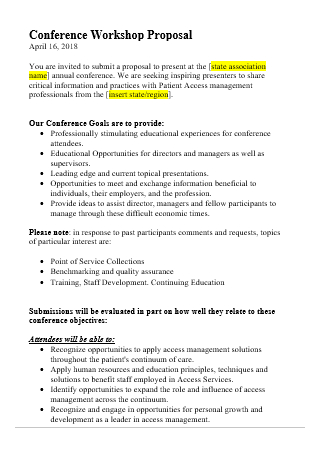
Conference Workshop Proposal in DOC
download now
FREE Conference Workshop Proposal s to Download
50+ Sample Conference Workshop Proposal
What Is a Conference Workshop Proposal?
Requirements of a Conference Workshop
Types of Conferences
How to Create a Conference Workshop Proposal
FAQs
How do you write a workshop proposal?
What kind of conferences are there?
How do you structure a workshop?
What Is a Conference Workshop Proposal?
A conference workshop proposal is a formal proposal that aims to pitch a conference idea to an event organizer or an event committee. A conference workshop is meant to educate, inform and enhance the skills and knowledge of the participants.
According to an online article by Globe Newswire, the worldwide MICE (meetings, incentives, conferences, exhibitions) industry’s estimated value peaked at $805 billion dollars back in 2017. Today, it is expected to reach over $1,300 billion dollars by 2028. Despite the negative impact on the event industry due to the ongoing COVID-19 pandemic, the MICE industry is expected to continue to adopt more digital solutions such as online conferences and webinars for the long term.
Requirements of a Conference Workshop
A conference workshop is still an event and just like any event, it comes with a set of requirements. The following examples listed below are some key requirements that should be on your checklist when proposing a conference workshop.
Types of Conferences
In the events industry, MICE (meetings, incentives, conferences and exhibitions) related events are increasing in number each year. And for each category under MICE, it can be further classified to more specific cases. The examples below tackle some of the most common types of conferences.
How to Create a Conference Workshop Proposal
To create an effective conference workshop proposal, your proposal needs to have a few essential elements. You can choose to start from scratch and create your own, or use an existing template to save more time and effort. Regardless, make sure to keep in mind the following steps when writing your proposal.
Step 1: Objectives
Your proposal should always begin with the statement of objectives. What do you hope to achieve in your conference? Who will benefit the most from the workshop or conference? It is crucial to lay down the purpose of your proposal. Without a clear goal from the beginning, you run the risk of submitting a half-baked or ill-defined proposal. Your objectives are supposed to set the tone of your entire conference proposal. It provides the direction of the proposal. Stating a singular or a couple of main objectives should suffice. Avoid listing too many objectives if you want to have a proposal that is specific and focused.
Step 2: Event Description
Once you have identified your conference objectives, the next step is to provide adequate details about the proposed workshop or conference. How are you planning to execute the event? Aside from the general information such as the date, time and location, you might also want to expound on the specific plans and strategies that will enable you to meet the objectives that were previously stated. Lastly, make sure to describe the plans not just for the event day itself, but also for its planning phase and its post-event phase.
Step 3: Itinerary or Program
As previously mentioned above, a typical conference is never without a planned itinerary. Whether it is a 3-day workshop series or a week-long trade conference, you need to present a proposed schedule of activities. As much as possible, provide as many relevant details as you can like the topic for the given day, location, duration, resource person, etc. Conferences, seminars and related events normally cover either a single or several topics all at once. Therefore, it’s imperative that a clear and straightforward program be found within your written proposal.
Step 4: Evaluation
Once you have gone over the general details and schedule of the conference, another key component in the post-event phase is the overall evaluation. Event and conference organizers need a tool that will allow them to gauge the success or failure of the event. This must be explained in detail in your conference proposal. These tools could be participant polls, feedback forms, or simple questionnaires. The main objective is to allow the audience members or participants to rate and give recommendations once they complete the workshop. The process of honest and candid evaluation offers organizers an opportunity for growth and improvement in the next event.
FAQs
How do you write a workshop proposal?
To write a workshop proposal, you need to first determine the objectives of your workshop. Next, describe the topics to be tackled then outline the itinerary schedule of the proposed workshop. Do not forget to include other important information such as the workshop facilitator’s name, required equipment, etc.
What kind of conferences are there?
According to an article published by Oregon State University, there are several different kinds of conferences. These include conferences, symposiums, seminars, colloquiums, workshops and roundtable discussions.
How do you structure a workshop?
To structure a workshop, it requires careful planning and preparation. A workshop presentation needs a compelling introduction, ground rules and a clear list of topics to be covered. You also need to determine how you want to present this to the audience or workshop participants.
Conferences and workshops are meant to help people learn, interact and improve both in their personal and professional life. If you are planning to organize a conference or workshop, browse the wide range of sample templates above to get started on your own proposal today!
